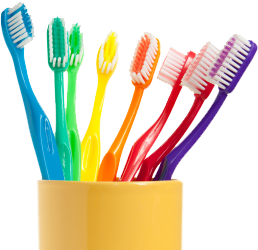General
How often should I visit the dentist?
You should plan to visit your dentist for regular checkups and cleanings every six months at minimum. Patients with gum disease or other complications should expect to visit their dental provider every three months. Keeping to that schedule can help you prevent additional complications and potentially more painful problems down the line.
What kind of toothbrush should I use?
We would recommend using an electric toothbrush if possible. But a regular toothbrush is fine, if it gets you to brush regularly. Brushing your teeth properly should take between two to four minutes depending on if you have gum disease or other ailments. Think of it as the length of one song.
How often should I change my toothbrush?
You should plan to replace a regular toothbrush every six months at minimum. The bristles become too soft over time and become less effective. If you have an electric toothbrush, it usually has a 3 month timer. Even if the brush head might look brand new, once they are bent they need to be replaced.
Do I really need to floss?
Yes, you do need to floss. Flossing helps you clean the food that gets stuck between your teeth, which regular brushing can’t get to. If food gets stuck in there for a long time, plaque begins to harden which leads to cavities. Removing that debris also helps you condition your gums to help prevent plaque build up. You should plan to floss every time you brush.
How can I improve my smile?
Let’s start with a question. What bugs you about your current smile? The answers may vary. Sometimes patients are not happy with crooked, chipped or discolored teeth. Some patients are concerned about their alignment or the shape of their teeth. Each patient is different. Smileworks will work with you to first identify the problem and then begin a treatment plan to help improve your smile to where you want it to be.
What can I do for stained or yellow teeth?
If your teeth are slightly yellow, Over-the-Counter (OTC) whitening toothpaste and whitening products can help whiten your teeth. Changes to your diet can also impact the color of your teeth as certain foods and drinks like coffee and tea, along with smoking or tobacco usage will affect their color. Most of our patients usually try to alter their diet and try the OTC products first. And mild discoloration might go away to your satisfaction. If that doesn’t work, there are more advanced whitening options you should discuss with your dentist.
Do I need to use Flouride?
You do need fluoride to keep your teeth healthy. Fluoride strengthens the enamel of your teeth and helps keep cavities at bay. The easiest way to get fluoride is to use toothpaste and/or mouthrinse with fluoride. We recommend brushing your teeth at least twice a day. If you are at a higher risk of cavities then we can prescribe certain toothpastes with stronger levels of fluoride than the OTC variety.
Do I have to get my wisdom teeth removed? What happens if I don’t?
You don’t have to get your wisdom teeth removed. But if you don’t get them removed, you could end up dealing with a great deal of pain over a long period of time. We usually recommend that our patients have their wisdom teeth removed before the age of 20, before the roots fully form. After 20, the presence of wisdom teeth can cause a number of different problems for patients. They can push on molars resulting in significant pain. They have a high risk of infection and are buried near a nerve. But we have seen some occasions where patients kept them in place and have not faced any adverse effects. We look at it on a case by case basis and we wouldn’t pull your wisdom teeth simply because you are over 20.
Pain
What can I do to prevent cavities and tooth decay?
There are a number of things that you can do to protect your teeth against cavities. The most important thing is to brush regularly, floss and use mouthwash. We recommend doing this twice a day at least. But what you eat matters too. Avoid acidic and sugary foods in order to prevent cavities and tooth decay. You should also schedule regular checkups and cleanings with your dentist in order to see where you might be at risk of developing cavities and tooth decay.
My tooth hurts. Do I need to see a dentist right away?
If one of your teeth is in pain, you do need to see a dentist right away. You won’t be able to figure out on your own why your tooth is hurting, or subsequently treat it. There are certain dental conditions that develop over time whereby the pain won’t even begin until the problem is in the advanced stages. Those cases usually require significant dental treatment. So the quicker you can get diagnosed, the quicker we can treat the pain. Regular checkups with your dentist can help us diagnose the problem before it becomes painful and uncomfortable for you.
My teeth are sensitive. What can I do?
If your teeth are sensitive you need to visit your dentist to determine a treatment plan. Teeth sensitivity will not go away on its own and ignoring it won’t help. It could get worse . Your treatment plan will depend on what type of sensitivity you have. Sensitivity to heat, cold or chewing are treated in different ways. Your teeth can be sensitive for a variety of reasons, including receding gum lines, chipped teeth or the formation of cavities among other reasons. The bottom line is we have to first determine where and why it's sensitive before creating a plan to help you reduce the sensitivity.
How can I avoid cavities?
There are three key things you can do to help prevent cavities. Be sure to have a daily routine to brush, floss and use mouthwash at least twice a day. Secondly, you can try to avoid sugary and acidic foods that lead to cavities and finally you should visit your dentist regularly for checkups to stay ahead of any dental problems you might face down the line. You can do everything right and still get cavities. Genetics certainly play a role in the development of cavities, but if you stick with the 3 key things, you can get ahead of cavities before they form.
What is gum disease? How do I know if I have it?
Gum disease is an infection that results from the inflammation of the soft tissue in your gums. These can result in bloody gums. Brushing alone won’t solve the problem. The gums won’t heal themselves and requires professional treatment. There are two types of gum disease. The first is usually the result of a failure to regularly brush and floss or visit your dentist for cleanings. This can lead to gingivitis. Fortunately, it is reversible with the right treatment. The second type of gum disease is an infection that affects the bone. It is usually not reversible, but we can slow it down when treated.
What is a root canal? How painful is it?
When a cavity penetrates the nerve of the root, it can be incredibly painful and traditional pain relievers may not be effective. This may require a treatment called a root canal. The procedure involves removing and cleaning the nerve areas and is usually followed by a filling or a crown after the root canal is completed. Root canals gained a reputation for being a very painful procedure, but the use of numbing agents have greatly reduced the discomfort of the procedure.
What can I do about missing teeth?
Missing teeth can take a toll on patients. It changes the way people eat, smile and impacts their confidence. There are usually three ways to treat missing teeth. The first option is a denture or retainer. This is usually the most economical option. The second is leveraging your existing teeth to build a bridge. The third and usually most expensive option is an implant. We use a titanium root where the tooth used to be. Smileworks works with a specialist to help our patients evaluate their options.
What causes tooth decay?
Tooth decay is caused by bacterial acid that erodes your tooth enamel and can be quite painful. The bacteria comes from the sugar that we eat, so diet plays a big role in avoiding tooth decay, as can your regular brushing habits. But some teeth are difficult to clean. You can do everything right and still end up with tooth decay. It’s best to catch it early. We can usually treat tooth decay with a filling or crown depending on the situation.
Money
Do you take payment plans?
We understand that some treatment plans may exceed the benefits offered by your insurance coverage. For larger treatments, Smileworks will offer financing and payment plans that can be paid over a period of time. You can speak with our front desk representatives to discuss it further.
I don’t have insurance. Can I still see a dentist?
Yes, Smileworks doesn’t require that our patients have dental insurance. We accept non-insurance payments. Smileworks also has a dental service membership plan that offers you reduced costs for out of pocket expenditures and regular checkups, which has been particularly helpful for many of our patients in the last few years.
We Are Committed to Your Oral Health
At Smileworks of Redondo Beach, we are committed to ensuring your oral health is in excellent condition. We make this possible by attending to all dental issues, existing and potential, during your visit. Call us at 310-303-7930


